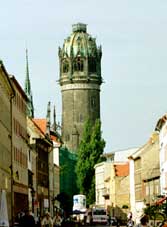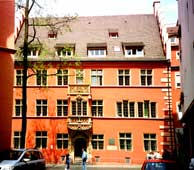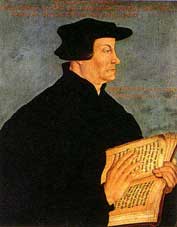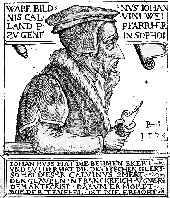 |
Patrick Delaforce & Ken Baldry'The Delaforce Family History' - Chapter 14
|
Chapter 14
'No one is sure that his own contrition is sincere'
Martin Luther
The Reformation
For example, the Church burned Jan Hus when he was under 'safe conduct'. Into this ferment was thrust the invention of printing, which rapidly extended the amount of bible study by the laity, especially when vernacular editions of the bible were produced. So, Luther's theses were a spark into very dry tinder. It was extremely brave of him, because of the risk of being burned but he did have the protection of Friedrich, Elector of Saxony. Theologically speaking, Luther was very conservative. He was a student of St. Augustine of Hippo, who in the 4th Century, did two contradictory things. He effectively set up the Catholic Church as Luther knew it but he also propounded the theory that there was nothing Mankind could do (by way of 'good works' or prayer or whatever) to impress God & that one could only rely on God's good grace for salvation. And salvation was a very serious concern in the 15th & 16th Centuries. During a period of enforced confinement for his own protection, Luther translated the bible into German, a direct assault on the notion that ordinary people needed a priest to mediate between them and God. The new thinkers were known as Evangelicals, as they were taking the Word as written in their newly re-translated or vernacular bibles, out to the people, a missionary activity which was imitated by the Catholic Church later in the Counter-Reformation but which the Catholics coupled with burning every vernacular bible they could lay hands on, in order to preserve their monopoly of interpretation to their own flock & their on-going agenda of suppressing dangerous (i.e. any) thoughts.
The half was Queen Elizabeth I's Church of England, a sort of Reformed Church but one who's doctrine she nailed down after only one year on the throne & which she absolutely refused to change, despite the on-going debates (some very bloody) in Mainland Europe among the various Protestant tendencies. There were good political reasons for this anomaly, as England had been through a cynical reformation under Henry VIII, a more thorough-going one under his son, the regrettably short-lived Edward VI & bloody reaction to Catholicism under Mary I, who barbecued many Protestants. Elizabeth decided on Protestant stability, under the 39 Articles of the Church of England (which do not quite add up, but never mind). This was, however, in 1559, which is rather ahead of our story. We will soon meet Philip Melancthon because he met & converted John Delaforce. Melancthon was a fellow professor of Luther's at Wittemberg University. It was he who knocked Lutherism into roughly the shape we know today, not without some resistance from Luther himself!
He tried to 'sell' this text to King François, to demonstrate that the evangelicals were the true loyal Catholic citizens of France but François was not having any of it, despite his use of the little wars for his own political purposes, not hesitating to send troops to fight with Protestants against the might of Spain when it suited him. After various unhappy peregrinations to Geneva and Strasbourg, Calvin eventually arrived in Geneva for good. It would be wrong to say he 'settled' there, as he always longed to return home to France but during the rest of his life (1509 - 1564) the mayhem his influence created in France made this impossible. For Calvin had worked out solutions to the problem of the boundaries between clerical & secular power. He also sent many disciples out into the whole of Europe (with conspicuous success in, for example, Scotland) &, as his message was more or less the same as Zwingli's, Calvinism became popular, even in France, where, among other things, the power split appealed to many of the aristocracy (a question of having their cake & eating it). Nobody is quite sure why the French Calvinists became known as the 'Huguenots'. France & the Huguenots are our special interest. The consequences of the Reformation there are in chapter 15. |
|
Contact: Ken Baldry for more information, 17 Gerrard Road, Islington, London N1 8AY +44(0)20 7359 6294 but best to e-mail him |



 John Calvin
John Calvin